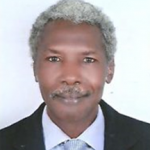Sudan is currently embroiled in high-intensity, catastrophic, and factional military warfare, which is a culmination of an acrimonious transition following a popular uprising that managed to depose the long-reigning kleptocratic regime of General Omer al-Bashir in December 2018. However, as grave as it may be, the heavy legacy of this regime was not only confined to a divided military. Under the watch of this regime, the country experienced a major economic decline following the independence of South Sudan in 2011, due to the loss of more than three-quarters of its oil revenue. The economy tumbled by almost 50 percent to become an archetype of what’s known in the macroeconomic literature as the “sudden stops.” In this paper, we argue that the same entrenched economic interests that explain the failure of the former regime to prepare for the massive economic and political shock waves associated with the partitioning of the country are also relevant in explaining why the military leadership reneged on their commitment to the constitutional transition to civilian democratic rule – even at the risk of squandering the economic gains and the popular political legitimacy associated with the revolution. In view of the current warfare, we argue that the post-conflict financing and policy package should target three main priorities: urgent post-conflict reconstruction support; moving fiscal policy and structural reforms from austerity to growth; and visible progress on an urgent timeline to create political support. Moreover, we use a long-term growth model to show that the economic cost for Sudan would be catastrophic should the current military warfare be left to spiral into a long-term ethnic civil war. Instead, we show that if peace is quickly restored and robust economic reforms are implemented, the country will achieve peaceful “renaissance” growth transitions, exploiting its huge agricultural potential.
ملخص
السودان متورط حاليًا في حرب كارثية بين الفصيلين الرئيسين من المؤسسة العسكرية السودانية، وهي تتويج لمرحلة انتقالية قاسية أعقبت الانتفاضة الشعبية التي تمكنت من الإطاحة بنظام الجنرال عمر البشير في ديسمبر 2018. ومع ذلك، وبقدر ما قد يكون الأمر خطيرًا، فإن الإرث الثقيل لهذا النظام لم يقتصر على الجيش المنقسم فحسب. ففي ظل هذا النظام، شهدت البلاد تراجعاً اقتصادياً كبيراً، بعد استقلال جنوب السودان عام 2011، بسبب خسارة أكثر من ثلاثة أرباع عائدات النفط. تراجع الاقتصاد بنسبة 50% تقريبًا ليصبح نموذجًا لما يُعرف في أدبيات الاقتصاد الكلي باسم "التوقفات المفاجئة". ونرى في هذه الورقة أن نفس المصالح الاقتصادية الراسخة التي تفسر فشل النظام السابق في الاستعداد لموجات الصدمة الاقتصادية والسياسية الهائلة المرتبطة بتقسيم البلاد، هي أيضًا ذات صلة بتفسير سبب تراجع القيادة العسكرية عن التزاماتها بدعم الانتقال الدستوري إلى الحكم الديمقراطي المدني، حتى ولو أدى ذلك إلى المخاطرة بتبديد المكاسب الاقتصادية والشرعية السياسية الشعبية المرتبطة بالثورة. وفي ضوء الحرب الحالية، فإننا نرى أن حزمة التمويل والسياسات في مرحلة ما بعد الصراع يجب أن تستهدف ثلاث أولويات رئيسة: الدعم العاجل لإعادة الإعمار في مرحلة ما بعد الصراع؛ وتطوير السياسة المالية والإصلاحات الهيكلية من برامج التقشف إلى النمو؛ وتحقيق تقدم واضح في إطار جدول زمني عاجل لبناء الدعم السياسي لبرامج الإصلاح الاقتصادي المنشودة. علاوة على ذلك، وباستخدام نموذج النمو طويل الأجل، نظهر أن التكلفة الاقتصادية للسودان ستكون كارثية، إذا تركت الحرب العسكرية الحالية لتتحول إلى حرب أهلية عرقية طويلة الأمد. بالمقابل، نبين أنه في حالة استعادة السلام بسرعة وتنفيذ إصلاحات اقتصادية متينة، فإن البلاد ستحقق تحولات نمو "نهضوية"، مستغلة إمكاناتها الزراعية الهائلة.
This paper is an output of the project on “Stabilization and Adjustment in MENA”. The project has been managed under the auspices of the Economic Research Forum and Finance for Development Lab (FDL). ERF acknowledges the financial support of the International Development Research Centre (IDRC) for this project.

Research Fellows
Ibrahim Elbadawi
Development Studies & Research Forum, Dubai

Authors
Magdi Amin
Managing Partner, African Renaissance Partners

Authors
Alzaki Alhelo
PhD, Tufts University

Authors
Kabbashi Suliman
University of Khartoum



